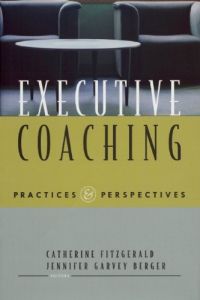Acesse a sua conta getAbstract para obter o resumo!

Acesse a sua conta getAbstract para obter o resumo!
Catherine Fitzgerald and Jennifer Garvey Berger
Executive Coaching
Practices and Perspectives
Davies-Black Publishing, 2002
Sobre o que é?
When you invite an executive coach to tinker with the thinking of your managers, be sure you know what you’re getting.
Recommendation
Organizational consultants Catherine Fitzgerald and Jennifer Garvey Berger offer a collection of articles by 16 executive coaches, including themselves. The essays cover executive coaching perspectives, practices and management. This book examines the range of managerial and psychological approaches shaping this emerging field. These expert articles provide a diverse overview, varying in complexity, practicality and therapeutic philosophies. The hazard of anthologies is the mix of voices, so there is some blurring between what is coaching and what is therapy, and some drift about exactly who is being spoken to, the coach, the manager or the executive. The book seems to focus primarily on the analytical, psychological and tactical tasks of coaches. However, getAbstract suggests that if you are hiring a coach for yourself or your organization, you may find this very practical in understanding what coaches do and in being sure you select a good one.
Summary
About the Authors
Catherine Fitzgerald, Ph.D., is a principal of Fitzgerald Consulting, which offers executive coaching to senior executives. She has been an adjunct faculty member at Georgetown University and the University of Maryland. She is coeditor of Developing Leaders: Research and Applications in Psychological Type and Leadership Development. Jennifer Garvey Berger, Ed.M., consults and teaches adult development, personality differences and transformational learning. She is a faculty member at the Bard Institute of Writing and Thinking and the Association for Psychological Type. She teaches at Harvard and Georgetown Universities and is the coeditor of Acts of Inquiry in Qualitative Research.



















Comment on this summary